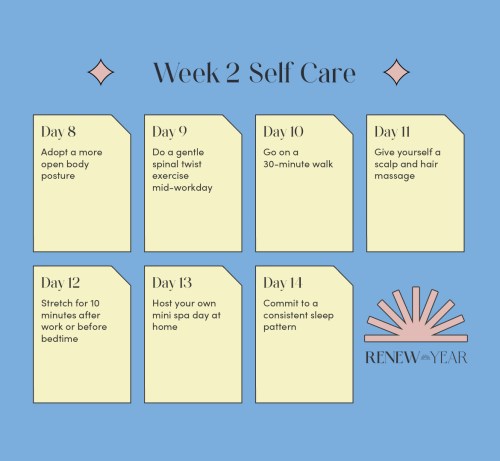Because the emotional and physical elements of our being are inextricably intertwined, it’s possible to practice soothing self care and relieve mental stress through physical means. When our bodies are well cared for, we often feel more peaceful and resilient in our minds, and more balanced emotionally. And when we regularly move our bodies, we work to ward off feelings of stagnation and lethargy, and feel more alert, focused, and energized across the different facets of our lives.
Experts in This Article
sleep expert and clinical psychologist
This is the power that we’re going to channel in this second week of our self-care-focused program. While rigorous exercises to strengthen and tone the body are essential to incorporate into your overall wellness routine, the physical practices you’ll find below are more focused on ways to relieve everyday stress through touch and gentle movement. Our bodies are our sacred temples carrying us through life, and with these daily tips, you’ll learn to treat yours as such.

Day 8: Adopt a more open body posture
You might know that embracing an upright, open posture can spare the muscles in your back (and arms and legs) from stiffness and soreness—particularly if you’re sitting all day. Not to mention, remaining upright instead of slouching can even expand your lung capacity and help you to breathe more efficiently, which can leave you with more energy and stability throughout the day.
But the benefits of good posture aren’t just physical; caring for the way you hold your body can have mental upsides, too. Science shows that sitting up straight in your chair and leaning your chest forward can lead you to feel more confident in your own thoughts. Projecting confidence through an expanded and open (versus contracted) body posture may also help you feel more positively about yourself and your body image.
This is why I recommend using the first day of this week to really think about taking up space. Start the morning by practicing an open, expansive body posture in front of a mirror and feel what it feels like to stand in your truth. Throughout the day, even when you’re sitting, try keeping your posture top of mind to see how it shifts your outlook.
Day 9: Do a gentle spinal twist exercise mid-workday
Full, free-form movement of the spine tends to get missed in our regular exercise routines, but I believe taking care of this part of the body is an integral part of self care. The spine acts as our central energy channel, and the seven chakras are located along its length, each one corresponding to a different aspect of energy expression in your life, including communication, creativity, giving and receiving love, and so on.
On this day, send energy and love to your spine by taking a few minutes to do a gentle spinal twist while seated at your desk (reach one arm across your lap and grab hold of the opposite side of your chair) or a simple yogic backbend (like the heart-opening camel pose).
Day 10: Go on a 30-minute walk
Sure, it may be tougher to motivate yourself to get outside for a walk in January if you live in a cold climate, but I promise it will be worth it. Generally speaking, there are a whole slate of mental-health benefits that can be derived from walking. It can boost your mood, facilitate positive affect, reduce feelings of anxiety, and elevate your creativity.
But taking a walk in the cold comes with its own additional perks. Not only are you getting a much-needed dose of sunlight and fresh air during a time of year when we tend to get less of both (helping to regulate your mood and circadian rhythm as a result), but also, you’re doing more cardiovascular exercise (especially if it’s a cold, windy day), as your heart and lungs will come up against more resistance. That’s a win-win for mind and body.
Day 11: Give yourself a scalp and hair massage
I especially love practicing Abhyanga, a full-body oil massage, in the winter to boost circulation and calm a frazzled nervous system. (In fact, a small study found that a one-hour Abhyanga massage decreased the heart rates and subjective stress levels of 20 participants.) But on days when I’m looking for a quicker way to relieve physical stress and feel better in my body, I focus on just my scalp and hair.
I like to take an herbalized Ayurvedic oil (but you can also use a basic cold-pressed sesame oil), put about eight or nine drops directly on my scalp, and massage from there. Carving out time to do this before a shower is an act of self care, and the practice of self-massage offers a wonderful opportunity to show yourself some physical love.
Day 12: Stretch for 10 minutes after work or before bedtime
Taking a few minutes to unwind tight joints and unclench stiff muscles can help you release both physical and mental tension. And gently moving your body (particularly if you’ve been sitting all day) can feel restorative and relaxing before bed, which is why I recommend doing a short stretch today, either in the evening or just before you go to sleep.
Check out this soothing end-of-day stretch routine for inspiration:
Day 13: Host your own mini spa day at home
What better mind- and body-soothing activity for a Friday evening than a personal spa night? While you can certainly do the full-body version of the oil massage from Day 11 above, I also recommend taking a salt-y bath, using Epsom salts (aka magnesium sulfate). When these salts dissolve in warm water, they release magnesium and sulfate ions, which may help reduce inflammation and soothe sore joints. Just the act of soaking in a warm bath can serve as a physical way to relieve stress, as it requires you to press pause on your to-do list and relax in one place for several minutes.
From an Ayurvedic standpoint, salts (including sea salts and Epsom salts) have also historically been used for cleansing purposes—not just physically but energetically. In that realm, a salty bath at the end of the day can also be a nice way to clear negative energy that you may have absorbed from others and to connect back to your spiritual center.
Day 14: Commit to a consistent sleep pattern
If you aren’t sleeping well, chances are, you aren’t living energetically and peacefully during your waking hours. Biologically, we need sleep and rest before almost anything else, and sleep deprivation can have serious mental- and physical-health detriments. While there are many things you can do to improve your sleep, from making sure to prioritize sleep to boosting your sleep hygiene, one simple practice I recommend is to commit to a regular sleep pattern. After all, sleep operates in alignment with our circadian rhythm (aka internal body clock), and a consistent sleep pattern ensures that you’re not throwing that rhythm off.
I recently invited sleep specialist and clinical psychologist Michael Breus, PhD, onto my podcast, The Feel Good Podcast. He noted that, physiologically, it’s most helpful to stick to the same wakeup time each morning. So, on this last day of week two, try committing to that wakeup time and embracing a regular sleep pattern as an empowering part of your self-care ritual.
Sign Up for Our Daily Newsletter
Get all the latest in wellness, trends, food, fitness, beauty, and more delivered right to your inbox.
Got it, you've been added to our email list.











